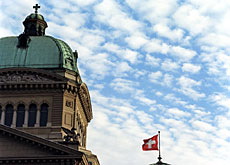
Political upheaval marks Switzerland’s year

A parliamentary election result few political pundits predicted and a super-Sunday of voting were a couple of the highlights in a year which put paid to the myth that little changes in Swiss politics.
The year was topped off with a cliffhanger cabinet election.
The rightwing Swiss People’s Party stamped its authority on the political landscape in 2003 by becoming the biggest party in parliament after October’s elections, and winning a second seat in the seven-strong government in December’s cabinet vote.
And it was the party’s populist driving force, Christoph Blocher who took that seat, narrowly beating the centre-right Christian Democrat, Ruth Metzler.
It was the first time in more than 130 years that an incumbent minister had not been re-elected, and Metzler’s defeat left just one woman in government.
Speculation had been rife in the weeks leading up to the vote, with the People’s Party targeting both Christian Democrat seats and that of the centre-left Social Democrat, Micheline Calmy-Rey.
The party had also threatened to walk out of government completely if Blocher failed in his bid.
Chaos
Political analysts worried that the cabinet vote would result in chaos, but after Blocher’s election voting went true to form with the remaining cabinet ministers all securing re-election with healthy majorities.
Blocher’s appointment to office was the first change in the political make-up of the cabinet in over 44 years.
Hans-Rudolf Merz joined Blocher as the other new face in government.
He won the race to replace the centre-right Radical Party’s Kaspar Villiger, who was retiring.
With both Merz, who is on the Right of his party, and Blocher winning seats the Swiss government took a definite shift to the Right.
Merz is to take over from Villiger at the finance ministry, where he will have to face a challenge from the cantons against proposed tax cuts at a time when parliament has approved record spending cuts of about three billion francs.
Hardline
Blocher is the new justice minister, and observers are waiting to see how he will deal with a job that will probably require him to present a government line likely to run counter to his own well-documented and outspoken hardline beliefs on issues such as citizenship, asylum, and closer ties with the EU.
The scene for so much confusion and speculation over the outcome of the cabinet election had been set in October, when the People’s Party became the largest party in parliament.
In just eight years it had gone from being the smallest of the four government parties to the biggest.
But under the informal power-sharing agreement in place since 1959, it only had one cabinet seat.
The party not only secured the largest share of the vote nationwide receiving 26.6 per cent, it also made inroads into French-speaking western Switzerland.
Winners
The other “winners” in the parliamentary elections were the Social Democrats – they picked up 23.3 per cent of the vote.
But both the Radicals and the Christian Democrats saw their fortunes slump.
Ballot box
Elections are not the only time when the Swiss get the chance to go to the ballot box.
The country’s system of direct democracy leaves the last word on policy to the electorate, which can challenge any decision in a nationwide vote.
Four days are set aside each year and normally the Swiss are asked to decide on a just a couple of issues.
But in May, with parliamentary elections due and a backlog building up, the Swiss found themselves deluged with nine different questions on their ballot papers – the biggest voting round for 130 years.
The Swiss did not appear to be overwhelmed. Turnout, at 49 per cent, was higher than normal.
Rejected
Voters threw out proposals to ban nuclear power, and rejected a scheme that would have forced the government to guarantee the country’s 700,000 disabled, access to public buildings and transport.
The results were a slap in the face for the Left, which had recommended a “yes” vote on most of the issues.
Only the two government-backed reforms – reducing the size of the army and the civil defence system – were approved.
Switzerland’s relations with the European Union – of which it is not a member – celebrated a milestone in June on the first anniversary of a set of seven bilateral agreements governing trade issues and the free movement of people.
Bern continued its haggling with Brussels over a second set of bilaterals – including the Schengen-Dublin accord on crime and asylum – and pushed through a compromise deal which leaves banking secrecy intact.
But agreement on the new accords is far from being wrapped up and Swiss-EU relations are tipped to be one of the subjects to dominate the political agenda in Switzerland over the next year.
swissinfo, Jonathan Summerton
May 18: Swiss go to the ballot boxes in the biggest round of voting in 130 years.
September 16: Kaspar Villiger announces his resignation from the cabinet.
October 19: The Swiss People’s Party is the big winner in Switzerland’s parliamentary elections.
December 10: Christoph Blocher wins a seat in the cabinet.

In compliance with the JTI standards
More: SWI swissinfo.ch certified by the Journalism Trust Initiative




























You can find an overview of ongoing debates with our journalists here . Please join us!
If you want to start a conversation about a topic raised in this article or want to report factual errors, email us at english@swissinfo.ch.